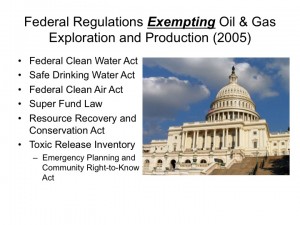Analysis by S. Tom Bond, Retired Chemistry Professor & Resident Farmer, Lewis County, WV
One of the principal arguments for extreme energy extraction is “the nation needs the energy,” but the extraction is not done by the nation it is done by a private corporation. According to current legal practice, a corporation is a “person.” It certainly belongs to a person or persons, with these individuals allowed to make the decisions and achieve significant personal benefits there from.
Favorable laws are constructed by government for the business, including (1) pooling, a form of eminent domain, (2) reduced taxes (subsidies), in the amount of $7 billion annually, see chart here; and (3) exemption from environmental laws applied to other businesses (as typified by the 2005 Energy Act). For this, Google exemptions from safety laws of the oil and gas industry. Notice the industry response, such as this one from Energy in Depth, one of the industry constructed apologists. Studying this debate would be a good exercise for a college Logic or Rhetoric class.
(4) Further, partly as the result of safety exemptions, is the death of 138 oil and gas workers in 2012, with a fatality rate eight times as many as the all-industry rate of 3.8 per 1000,000 workers, according the Public Radio, December 27, 2013.
(5) State regulations may be so weak they hardly amount to control at all.
(6) Compounds used are frequently unknown and have toxic properties ignored in spite of massive anecdotal evidence (this site has well over 5000 sick or injured listed). (7) Science is ignored. At a recent meeting at the University of Pennsylvania described as “a summary of the current science, ” Aubrey Miller, the senior medical adviser with the National Institute of Environmental Health and Safety, was the wrap-up speaker. He noted that the nation has some 52,000 unconventional gas wells, yet when he searched the literature for research, he found little. “How do we have no data on an enterprise of this magnitude?”
And there is (8) little personal contact between regulators and operators. West Virginia has only 27 enforcement officers. Only a few token citations are given. A summary of wells drilled, enforcement actions, and staff for WV from 2003 to 2011 is here, and data for other oil and gas states may be accessed at this site also. (9) Property value decrease, representing reduced usefulness of the surface, are generally ignored. In light of the original understanding of the “right to remove” entertained by a lessor one hundred or more years ago, the contract is invariably broken by the lessee today. The inertia of law, not keeping up with the technology changes as time passes, and legislative bias, ignore this fact.
Justification for this mess is “We need the oil and gas” or “We need the energy.” Which phrase used is mostly determined by whether the speaker is the employee of a company extracting the hydrocarbon, or whether an “expert” from government or academia. The energy need and hydrocarbon use is never distinguished. No alternative.
Nor is the mixing of corporate and government prerogatives clarified. The use of force, that is taxation, fines, imprisonment, capital punishment, for the public benefit, is the exclusive prerogative of the state in modern times. It is blended, commixed, entwined and conflated with the corporations ability to place members of society in order according to its own uses, some at the top receiving vast rewards, some receiving crumbs according to the corporations uses, and some left entirely out.
Both corporate and government-academic expert speakers seem not to recognize diminishing the organic resources of the surface of planet is a problem resulting from extreme extraction, as is reducing social cohesiveness by alienating those who dwell near extraction. Using governmental violence on behalf of the corporations in places like Nigeria and Ecuador to control those who live in the lands affected by extraction has not much effected corporate operations. Those natives used violence against superior forces.
Here the “homeland” the problem is different. The natives are the same color as corporate leaders, speak the same language, wear the same clothes, read the same media. They are harder to dismiss. Worst of all, they have the same government. That government’s loyalty is fleeting. Every four years those who govern have to be reelected. Also the legal structure corporations have built into law during the last 150 years and in legislation over a shorter time requires increased maintenance as time goes on: the technology changes and people become better informed.
Opposition to extreme energy extraction is greatest where people are the most educated, the most able to communicate, the most dependent on making their own decisions, and close to the damage. Support occurs where there is trickle down from the corporations: subcontractors, remote royalty owners, investors, workers at various levels, politicians on the take and who lack the ability to understand what is going on, and people who really don’t care about facts on the ground, habitually accepting what they are told.
Our hope, those of us that are being harmed and who care about the future, is to make others see what is going on. To try violence is to face something that looks like like Darth Vader’s troops – body armor and all. To convince others is work, but we have time for that, and motivation, and there are a lot of us and we don’t need paid – our pay is to stop the damage against us, our health, our children’s future.
Tune in ten years from now. The political climate will be different when damage to the earth, sick people, and wealth concentration by taking the hydrocarbons out of the earth have increased. Will the Darth Vader-like forces control or will enlightenment prevail?

